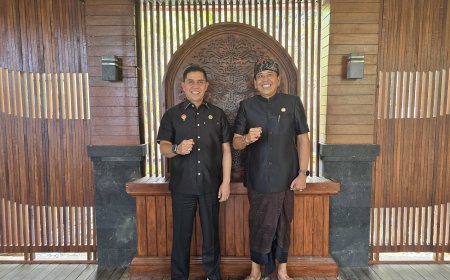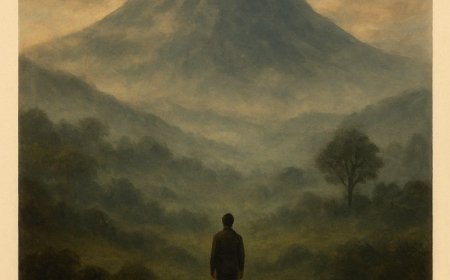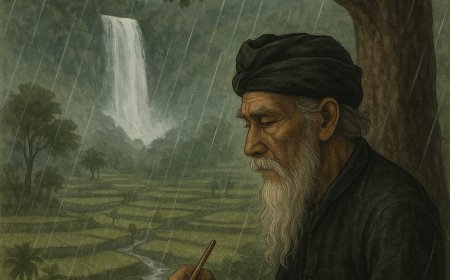The Legend of the Sandalwood Tree of Alas Purwo

One day, in the sacred forest of Alas Purwo, stood a towering sandalwood tree that seemed to pierce the sky. Unlike any other tree, its trunk was strong, its leaves eternally green, and its fragrance drifted gently, as if transcending the bounds of time. Upon its bark was clearly etched the number eight — a mark not carved by human hands, but entrusted by the universe.
Those who gazed upon it would be reminded of the teachings of Asta Brata and Asta Yoga, the guiding principles of great leaders since ancient times. It is said that King Udayana of Bali Dwipa once practiced these teachings so profoundly that his influence reached across the seas, even to the distant desert land now known as Australia.
As a wanderer stood transfixed before the tree, he suddenly felt a gentle tap on his shoulder from behind. Turning around, he saw an elderly woman, her face serene though her age seemed to have reached ninety-five years. Her voice was soft, yet full of authority.
“My child,” she said, “what is it that you see?”
The wanderer fell silent, his head bowed. The woman continued,
“This sandalwood tree will remain fragrant until the end of time. The number eight you see is a sign of the generations to come. Those who preserve the fragrance of this tree are the ones who will safeguard life, protect the heritage of the ancestors, and guide the nation.”
Hearing this, the wanderer fell prostrate, bowing to kiss the old woman’s feet. He called her Mother. In his heart, he was certain that this woman was Gayatri, the mother of Queen Tribhuwana Tunggadewi, the great ruler of Majapahit, and the guardian of Alas Purwo’s secret.
A faint smile appeared on the Mother’s lips. She gazed far into the sandalwood tree and spoke in a voice laden with meaning:
“My child, remember this... loyalty does not always mean faithfulness. But true faithfulness, that is always loyal.”
The wanderer placed both hands upon his chest, bowed respectfully, and whispered softly,
“Rahayu, Mother.”
And from that day on, the fragrance of sandalwood in Alas Purwo was believed to be not merely the scent of the forest, but also the symbol of a solemn promise of fidelity — from generation to generation — to the ancestors and to the motherland.
Rahayu... Rahayu... Rahayu.
By: Ngurah Sigit
The author is a Sociologist, Cultural Observer, and Media Commentator.
Mau saya buatkan juga versi literary-polished dalam bahasa Inggris (lebih puitis, cocok untuk publikasi internasional), atau cukup translasi yang setia pada teks aslinya ini?
What's Your Reaction?

























































